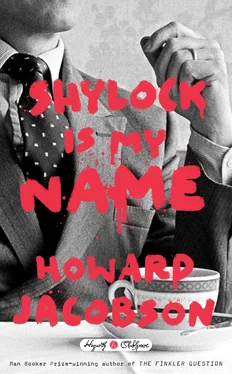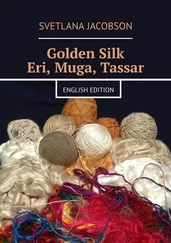“Or to scare him off altogether,” D’Anton put in.
“I know that. I’m not the fool you take me for. But now, whatever Beatrice decides to do, it’s a question of honour, isn’t it? It isn’t the flesh he wants — who’d want that, especially from Gratan? — it’s the principle. He won’t care how he gets it or who he gets it from. Jews aren’t particular who pays what they believe they’re owed. Give him what he wants and I’d like to bet we won’t hear any more from him. And since we can’t give him Gratan…we have to give him someone else.”
A quiet descended on the party. Even the bar seemed to fall silent.
“But there’s no point my offering, though I would do anything for you,” Barnaby went on. “I faint at the very thought of blood.”
“And since I am disqualified by gender…” Plury began.
“That leaves just me,” D’Anton said.
—
You should sit in the dark more, D’Anton would tell the students who came to hear him think aloud. Not quite lectures, they were not quite classes either. He wanted more distance between him and his students than the word “class” implied. It isn’t good for you, he would go on, to live in so over-illuminated a world. If I say you spend too many hours looking into screens I don’t want you to mistake me for a moralist or a Luddite. My only concern is for your aesthetic welfare. Light is to be cherished, in the way great painters like Leonardo and Caravaggio cherished it, as an illumination of meaning, as a way of distinguishing between the mundane darkness of things and the glow that can come with understanding and discrimination. You lose a sense of beauty and volume if everything is light.
Did any of them listen?
Well one student, he remembered, did. “In your discussion of chiaroscuro you haven’t mentioned Rembrandt,” she put up her hand to say. “Wouldn’t you agree that for Rembrandt, perhaps more than for any painter, light was a form of psychological insight?”
That student was Beatrice. He saw her clearly now, in shadowy retrospect, her golden bangles dancing about her wrists as though she’d raised an arm to shake a tambourine, her own innate darkness illuminated as though by the psychological insight — call it the operation of conscience — he was bringing to bear upon himself. Was that the moment when he lit upon her as a plaything for Gratan? Was she Susanna in Rembrandt’s great painting, and he the more forward of the Elders? Such a scene answered to no prurience he recognised in himself, but he must have gone so far as to imagine how she might stimulate prurience in another man — otherwise why did he choose her? So didn’t that make him a partner or co-conspirator — a pimp, Plury had called him — in titillation?
How many times was that in recent days that he’d sunk a line into his soul and drawn up the word “procurer”?
He sat in the dark — the dark he emitted as a man of sorrows, and the more mundane dark he controlled with the flick of a switch — and pondered.
He would have liked his eyelids to have been of thicker, more opaque tissue. He had read that only the prepuce and the labia minora were thinner-skinned than eyelids, but as light didn’t come to him through those he found no consolation in the knowledge.
The light that did come to him, no matter what he did to shut it out, was violet, the colour of amethyst. This was the reason he rarely bought a paperweight or miniature that had amethyst in it: he found the stone too rich and the light it gave off too searing. Amethyst was the colour of his neurasthenia, the colour of what offended his taste, the colour of his antipathies. Strulovitch was one of those antipathies, though he’d have been hard-pressed to say whether, in this instance, the antipathy or the amethyst came first. Was Strulovitch amethystine in person? Was there something of the mineral’s violet hardness in the sheen of his skin? Was it his voice that shattered with too much light D’Anton’s attenuated nerves? He could more easily have explained why he hated Strulovitch morally. He hated the fact that Strulovitch bought and sold art, no matter that he bought and sold art himself. His own buying and selling had love at their centre; he traded because he loved the thing he traded in. Whereas Strulovitch, by his estimation, loved art incidentally, that’s if he loved it at all, the ecstasy of it, for him, residing in the final balance sheet of beauty. This D’Anton knew, not from anything Strulovitch said, and not from anything he observed or heard about his practices as a connoisseur and buyer. He knew it because Strulovitch was not refined as he, D’Anton, was refined. To be alive didn’t pain him as it pained D’Anton. He lacked excruciation. Beauty didn’t run through him. If beauty perished from the world, would Strulovitch act any differently? D’Anton could not conceive existence other than as an exquisite torment of the feelings. If there were suddenly to be no beauty in the world he would feel it into being. But Strulovitch? No, Strulovitch wouldn’t notice. He was too consumed by the materiality of things. And what was material was, to D’Anton, the colour of amethyst.
Beatrice too. A magenta spray of hair, her glance a gleam of mulberries, words like plums in syrup.
Was this what Gratan loved — the rich, pulsing presentness of the girl. Her insolent palpability?
Must have been.
So how did he know so well what Gratan loved?
D’Anton was a connoisseur of small things — miniature portraits, teardrop paperweights, pricks of conscience. Though abstemious by temperament he was acquisitive, as only the vain can be acquisitive, of elegant self-torment. He punished himself mentally for having too much money; for being well educated; for having exquisite taste; for being multifariously gifted. People came to him for assistance and he didn’t always give all they looked to him to give. Alternatively, he gave too much. In the amethyst dark of his fractious egotism he counted off his failings, of which one was perhaps the mirror image of all the others — too great a collusion in the afflictions of those he loved. Was Gratan’s weakness for Jewesses an affliction? Well he’d fed it, however it was to be described. Fanned it. Stoked it. But what if he’d been fanning some comparable affliction in himself? Did he too, behind the purple veins of his eyelids, nurse a weakness for the colouration of Jews? Was Strulovitch not so much an antipathy as a corrupt esteem?
“Desire” was a word he wouldn’t use. So far and no further. And “esteem” was far enough. But if there were some lurking, unholy, unacknowledged esteem, then he had done poor Gratan a great disservice, led him on to go where D’Anton himself wanted but did not have the courage to go. I owe the boy some recompense, he thought, with a shudder of that excruciation of which he believed Strulovitch to be incapable.
He had loved reading the lives of the Christian martyrs at school and tore out many illustrations to pin on his bedroom walls. One of his favourites was St. Lawrence who was roasted on a gridiron. D’Anton could, without difficulty, conjure up Tintoretto’s famous painting of Lawrence’s martyrdom, the light illuminating his suffering as cruel figures poked at him, prodding at his agony, from the darkness. There was a legend that St. Lawrence had ordered his tormentors, if they were going to cook him, at least to cook him properly. “Turn me over,” he told them. “I’m well enough done on this side.”
D’Anton had a taste for torment. Did that mean he also had a taste for his tormentors?
“Turn me over,” he imagined begging Strulovitch.
—
“Are you really prepared to do this for us?” Plurabelle asked.
D’Anton closed his eyes. Sometimes there was no need for words.
Читать дальше












